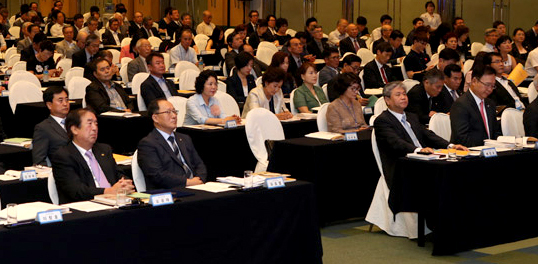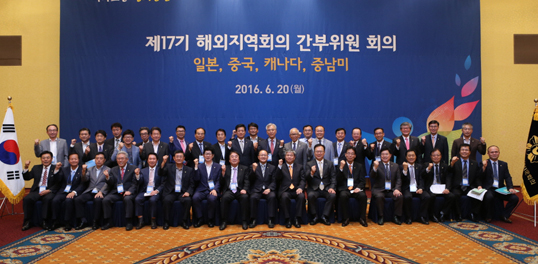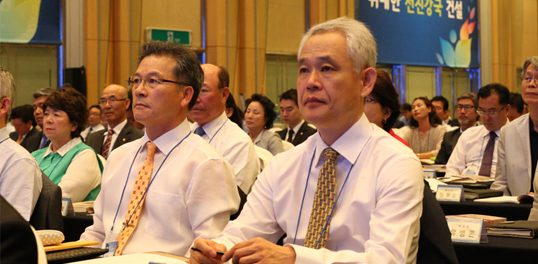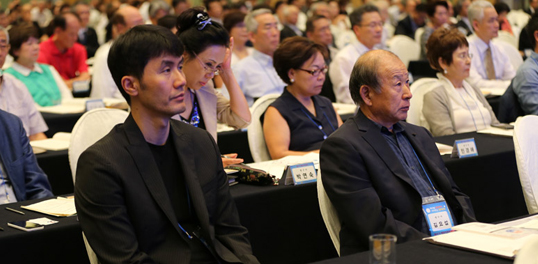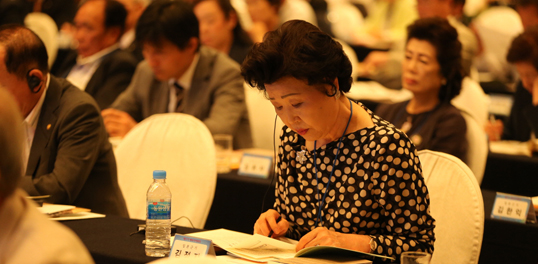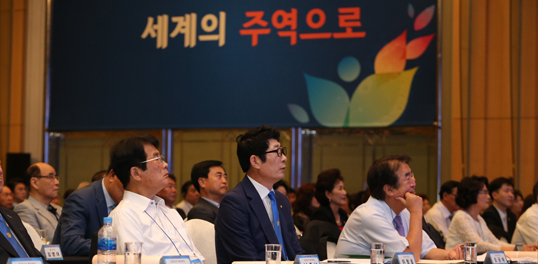17th Conference of Overseas Provincial Assemblies (Japan, China, Canada, Latin America)
“United spirit for unification, approaching peaceful unification”
“Only by taking strong action against North Korea’s provocations can the hope for peace and unification continue…”
The 17th Conference of Overseas Provincial Assemblies was held for four days and three nights from June 20 to 23 at the Grand Hilton Hotel in Seoul. Participating were 463 council members from 14 municipal chapters in 24 nations including Japan, China, Canada, and Latin America.
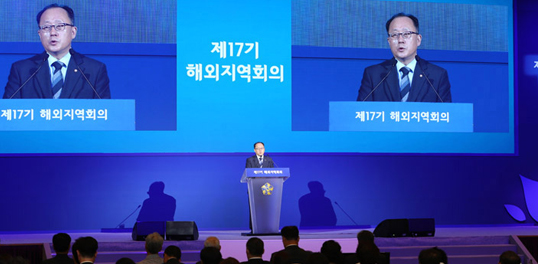
Participating Council Members in the 17th Conference of Overseas Provincial Assemblies
Day 1: June 20 (Mon.)
Under the slogan “united spirit for unification, approaching peaceful unification,” the conference began on June 20 with an orientation, followed by executive council member discussion and welcome banquet hosted by the executive vice-chairperson.
In his welcome remarks, Executive Vice-chairperson Yoo Ho-yeol expressed his gratitude and support to the council members coming to participate in the conference after long flights from all over the world and expressed his hopes for the conference. “With the aim of uniting the overseas Korean society’s spirit of unification and solidifying resolve for peaceful unification, this conference can be a place for active discussion and interaction,” he said.
Day 2: June 21 (Tues)
An opening ceremony was held on Day 2, June 21, followed by the executive vice-chairperson’s keynote speech, report on NUAC’s main works, explanations of the Ministry of Foreign Affairs’ policies, and divided discussions of individual councils and presentations of the results.
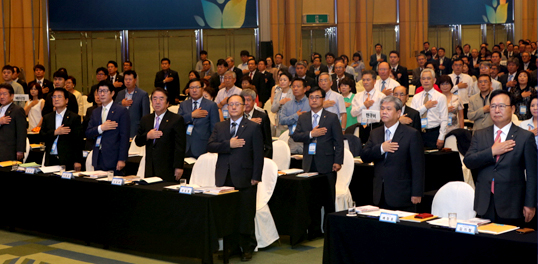
Council members
In his keynote speech titled “Age of Denuclearization and Unification on the Korean Peninsula, NUAC Will Bring,” Executive Vice-chairperson Yoo Ho-yeol asked overseas council members to share their visions of unification and join forces and work actively so that North Korea disposes of its nuclear power and steps onto the path of unification.

Executive vice-chairperson giving the keynote speech
“The provocations of North Korea and its delusions of trying to maintain its Kim Jong-un system greatly jeopardize North and South relations including the surrounding situation of the Korean peninsula,” Executive Vice-chairperson Yoo Ho-yeol explained.
According to him, for the past twenty or so years, we responded to North Korea in the hope that granting the conditions it proposed whenever there were provocations such as nuclear tests and missile launching would solve the problems peacefully. “If we allow North Korea’s reckless provocations any further, not only will peace on the Korean peninsula come to nothing; our hopes of peaceful unification will be for naught as well. Only by taking strong action against North Korea’s provocations can we protect peace and retain our hopes for unification -- it is the only way,” he stressed.
He added that, in response to North Korea’s provocations, the government will bring the Gaeseong Industrial Complex to a full halt, so that the international society will step forth in sanctioning North Korea; such actions were the beginning of finding a fundamental solution to changing North Korea for real, based on the judgment that it would be impossible to curb North Korea’s will for nuclear power development with previous methods.
In other words, halting the operation of the Gaeseong Industrial Complex carries the aim of blocking all foreign exchange entering North Korea and subsequently suppressing further development of its nuclear power and missiles. This decision played a central role in bringing about powerful North Korea sanctions in the UN Security Council.
“The many timely actions of overseas council members all over the world regarding North Korea’s provocations, such as rallies, contributed greatly to the international society’s participation in the North Korea sanctions,” Executive Vice-chairperson Yoo said.
He asked that they strive consistently so that North Korea stops its reckless provocations and expressed hope that peace and unification on the Korean peninsula continue.
Before this, opening speeches were given by Oh Gong-tae, vice-chairperson of the Japan Assembly, Kim Ki-chul, vice-chairperson of the American Assembly, and Lee Chang-ho, vice-chairperson of the China Assembly.
“I hope this conference becomes an opportunity to renew the correct perception of unification and sense of national security, solidify the sense of community, and pave the way for a bright future,” said Japan Assembly Vice-chairperson Oh Gong-tae.
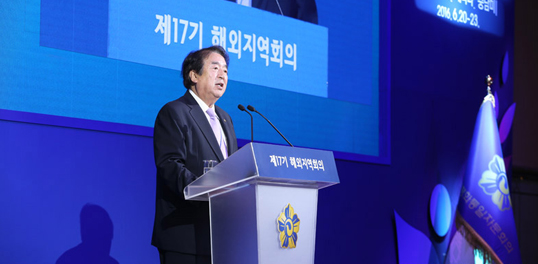
Vice-chairperson of the Japan Assembly giving an opening speech
Addressing the council members, American Assembly Vice-chairperson Kim Ki-chul said that he was moved by their efforts, and that, despite the difficult situation, with sense of responsibility and pride as council members of NUAC, they strove to create public opinion and awareness on unification in their respective countries. Such energy must be recharged through this conference, he stressed.

Vice-chairperson of the American Assembly giving an opening speech
“Through this conference’s diverse programs, may we share our opinions, brace our spirit of unification, and spread it to the society of our countrymen in each region of the world and to the local community,” said Lee Chang-ho, vice-chairperson of the China Assembly.
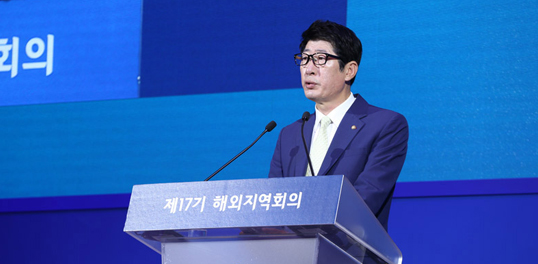
Vice-chairperson of the China Assembly giving an opening speech
After the opening speeches and keynote speeches, the “2016 Report on Major Works” was presented.
Through an activity report, Secretary General Bae Jung-ho gave a detailed record of NUAC’s major works and future plans.

Secretary General presenting the activity report
Secretary General Bae Jung-ho explained the 17th NUAC’s goal of leading unification preparations among the people, including what it had selected as its main progress directions -- △public sympathy through the creation of an environment prepared for unification; △public accompaniment through upward communication and strengthened reflection of public opinion, and; △public unity through full-scale unification preparation -- and reported in detail the works currently underway in 2016 on such basis.
Secretary General Bae Jung-ho also expressed his gratitude to the overseas council members for all their actions to procure the international society’s support for the government’s unification policies and the Korean peninsula’s unification.
“Let the overseas council members who are active in the 43 municipal chapters in the 117 nations all over the world become the footholds of the unification movement overseas. Be the leaders in awareness and participation and strive to move together with the mainstream local society as well,” he added.
Afterward, Vice Foreign Minister Cho Tae-yul gave a lecture titled “Peaceful Unification and Trust Diplomacy — the Fruits and Tasks of 3 Years,” explaining the outcomes and future direction of the diplomacy policy carried out by Park Geun-hye’s government for three years.
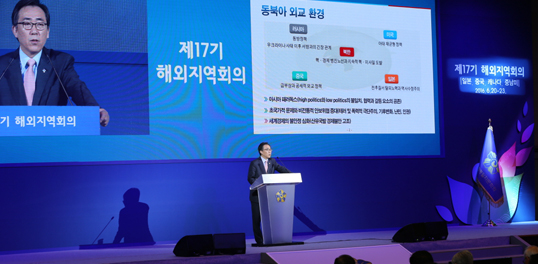
Vice Foreign Minister Cho Tae-yul explaining the diplomacy policies
“Park Geun-hye’s government set sail in the gravest situation of diplomatic security 20 years after the end of the Cold War, which was a dramatic change in the geopolitical structure of Northeast Asia.” said Vice-minister Cho, who went on to explain such environment of diplomatic security.
Taking up as his main point the changes that took place on the surrounding four rivers, Vice-minister Cho discussed △the rise of China and President Xi Jinping’s “Chinese Dream,” the relationship between new big states, the concept of new security in Asia, △the US’s Pivot to Asia policy, △Japan’s offensive security policy and friction with Korea and China over past affairs, and △the changes in foreign relations with the Ukraine incident in Russia as a turning point.
“The biggest task in our diplomacy is the nuclear threat from North Korea and its nuclear power-economy side-by-side route, which is the biggest threat to national security as well as what’s complicating our relationship with our neighboring four nations,” he explained.
According to him, the Asia paradox is deepening, which means our conflict in terms of security increases due to the lack of trust between the Asian nations, but our interdependence continues to increase economically. “We are putting forth a Northeast Asian peaceful cooperation design wherein we cooperate starting with the soft security issues,” he added. He went on to explain about whether or not the Korean Peninsula Trust Process should continue.
“Because of North Korea’s fourth nuclear test and continued provocations, voices of doubt have been raised, asking if the Korean Peninsula Trust Process has been discarded, but the Korean peninsula trust process has not been given up; if North Korea gives up its nuclear power and shows signs of change, the trust process will be resumed. Therefore, it is still in process,” said Vice-minister Cho.
He noted that the North Korea nuclear problem is not simply a nuclear problem; we must view it in the larger frame of a North Korea problem, he said. “We are treating the North Korea nuclear problem with the understanding that North Korea’s fourth nuclear test was a problem that shook Northeast Asia’s security geography and changed the fundamental characteristics of North Korea’s nuclear threat,” he added.
According to him, Until North Korea changes its ways, we will continually strengthen our diplomatic pressure and make it pay for the painful consequences and eventually give up its nuclear power.
“We have fortified the triangular diplomacies — Korea, China, and Japan, Korea, the US, and Japan — and strengthened the basis for more closely cooperating on the North Korea nuclear problem as well. We are moving forward with our diplomacy with the vision that we will be △ a facilitator in global diplomacy, △a supporter of developing nations, and an initiator that leads and has the upper hand on global agendas,” Vice-minister Cho said.
Lastly, Vice-minister Cho stressed that it is time for Korea to exhibit global leadership and strengthen it, and that overseas council members must proudly give greater support to our cooperative relationship.
“If council members join in the government’s efforts and make their presence strongly felt in their respective regions, it will come back as a great help to our diplomacy, and it will be a strength and a resource for solving the current diplomatic issues of the Korean peninsula and all of Northeast Asia,” he said, asking for overseas members’ work and support.
Next was the luncheon hosted by Japan Assembly Vice-chairperson Oh Gong-tae, followed by divided discussions in individual councils.
Through the divided discussions, the council members debated on some of the councils’ activities, such as △ direction of unification and public diplomacy, △building of awareness in the overseas Korean community, △conduct of unification and history education to overseas Korean youths, and △ways of supporting North Korean refugees residing oversees.
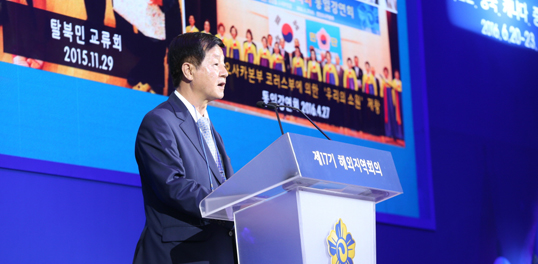
Kwon Oh-il, Chairperson of the Japan Kinki Council, presenting the results of divided discussions
After the three-hour-long divided discussions, the results were presented right away. The 14 chapters gave a vivid presentation on the direction of unification activities, reflecting the characteristics of the many localities.
The topics presented by each of the chapters were as follows:
△Eastern Japan: Role of Korean residents in Japan in peaceful unification; direction of the next generation’s succession of the unification issue (how to cultivate the spirit of unification)
△Japan Kinki: Ways to carry out the education on Korean identity and unification to the youth
△Western Japan: Ways to respond to hate speeches in Japanese society
△Beijing: Unification works in Beijing — Status and Tasks
△Guangzhou: The unification culture class comes to you — outcomes and tasks
△Qingdao: Unification stories with Korean nationals residing abroad and foreigners of Korean descent
△Shanghai: Unification preparations with the youth
△Shenyang: Plans for unification education for overseas Korean youths in border areas
△Toronto: Plans for establishing an overseas war veteran historical database business, consonance festival for the peaceful unification of Korea, and youth festival
△Brazil: Plans for creating awareness of unification in the Brazilian society
△Central America·Caribbean: Conducting public diplomacy on peaceful unification with nations that have made amity treaties with the US (Korean Descendants Cultural Institute in Cuba)
△ Western South America: Taking on the role of overseas council for creating awareness of unification
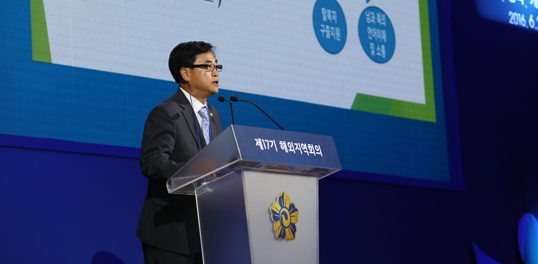
Kim Doo-yeol, secretary of the Vancouver Municipal Chapter, presenting the results of the divided discussions
Day 3: June 22 (Wed.)
On June 22, Day 3 of the conference, a cultural performance, a unification talk concert, and a Conversation on Unification session were held with overseas council members.
Park Gil-sung, Dean of the Graduate School of Korea University, gave a special culture lecture titled “ Dynamics and Spread of the Korean Wave.”
Dean Park explained systematically about △Korea and its image in the world, △ evolution and spread of the Korean wave, △ social evolution dynamics of the Korean wave, △ Korean wave’s appearance and essence, and △ Korean wave’s universal value and message, drawing considerable sympathy from the audience.
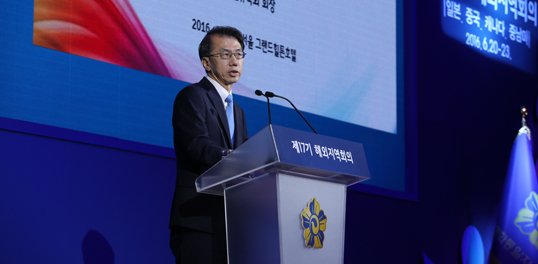
Park Gil-sung, Dean of the Graduate School of Korea University
“With national income of 20,000 dollars per head and population of 5,000 people, Korea is, in hard power terms, one of the world’s 7 strongest nations,” said Dean Park, who went on to explain the status, basic structure, and motivation of Korean society in the world as one of the five nations simultaneously exporting products and culture (US, France, Germany, Japan, Korea).
He also presented the results of a public survey conducted among people around the world. “The study found that soap operas, Korean food, and K-pop come to mind for 57% of the people when they think of Korea — people of the world now perceive Korea as a cultural nation,” he added.
In other words, this analysis suggests that, from a nation perceived in the past as a divided nation to one perceived as an economy nation, now, through the Korean wave, Korea is seen as a cultural nation.
“The image of cultural nation is playing an important role in turning the “discounts” that Korea used to have — divided nation, restricted nation, conflict nation, single culture, compressed growth, etc. — into premium,” said Dean Park, arguing that “Culture (Hallyu: the Korean wave) is the catalyst that is turning Korea Discount into Korea Premium.
He went on to add that culture will be the front wheel in helping Korea open the thirty-thousand-dollar-per-person income era, and that the Korean wave will be the key for the Korean peninsula to end its Cold War and the lever for it to achieve unification, drawing the attention of the participating members.
Dean Park continued to analyze and explain very convincingly the role of the Korean wave in the world as the △message of peace, △ message of dynamics, △ message of community, △ message of alternative, and △ message of peace, citing specific examples for each as he called the Korean wave △creative, △dynamic, △divergent and continued to win the sympathy of the audience.
A “Unification Talk Concert” on “What We Should Know About North Korea” followed.
The talk concert was hosted by NUAC Secretary General Bae Jung-ho, with Kim Jung-bong, chair-professor of Hanzhong University (secretary of the Central Committee), Jo Bong-hyun, chief researcher of the IBK Economic Research Institute, and North Korea Strategy Center Representative Kang Chol-hwan serving in the panel.
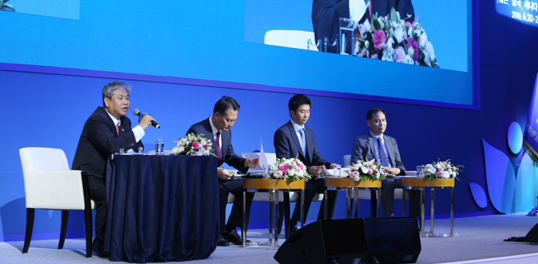
Unification talk concert
Chair-professor Kim Jung-bong was in charge of political questions, Chief researcher Jo Bong-hyun, economic questions, and Representative Kang Chol-hwan, human rights questions.
Chair-professor Kim Jung-bong gave clear explanations of North Korea’s nuclear tests, the reasons for the Gaesong Industrial Complex shutdown, the reason North Korea continues its nuclear development and long-distance missile launches, the THAAD placement problem, the effect of North Korea sanctions, the defecting North Korean restaurant workers’ problem, and all other current issues, aiding in the participants’ understanding.
Next, Representative Kang Chul-hwan talked about how his grandfather and parents were Koreans who lived in Japan, how they were shipped to North Korea as well as the difficulties they had gone through, and how they had escaped. He also gave a vivid testimony of the purging and violation of human rights currently going on in North Korea.
Dr. Cho Bong-hyun explained the status of the North Korea sanctions in detail, its economic effect, and its impact on the North Korean regime. He emphasized that the most important thing in the sanctions are its consistency, China’s participation, and a domestic united voice in the South.
The council members partook of the luncheon hosted by Kim Ki-chul, vice-chairperson of the American Assembly, and then moved to the Blue House to participate in the Conversation on Unification with overseas council members.
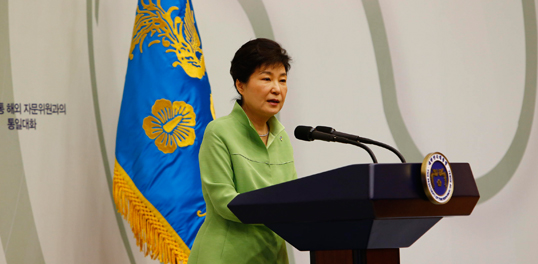
President Park Geun-hye giving a speech of encouragement in the Conversation on Unification with overseas council members
Meanwhile, during the conference, the council members heard the news of North Korea’s middle-distance ballistic missile launch and held an emergency executive committee conference, after which they selected and presented the “Resolution Condemning North Korea’s Middle-Distance Ballistic Missile Launch.”
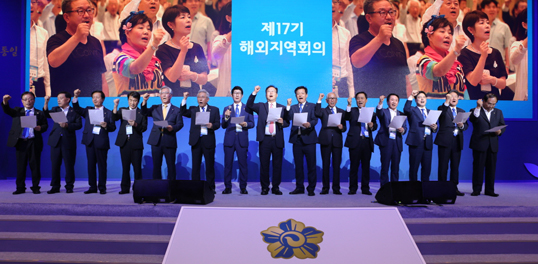
Council members selecting and presenting the Resolution Condemning North Korea’s Middle-Distance Ballistic Missile Launch.
After the Conversation on Unification, a farewell luncheon was hosted by Secretary General Bae Jung-ho, followed by a talent show of individual councils.
Day 4: June 23 (Thurs.)
On June 23, Day 4, members watched the documentary film “Under the Sun” produced by Russian movie director Vitali Mansky and toured the Seodaemun Prison History hall and War Memorial of Korea as a fitting end to their four-day program.
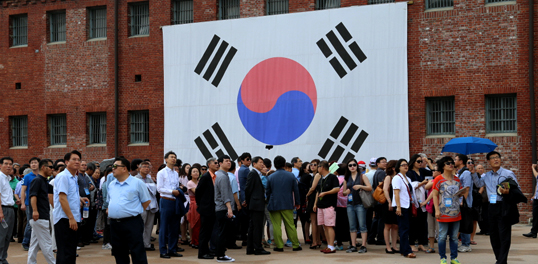
Visiting the Seodaemun Prison History hall
As the participating members looked around the sites of our modern history for themselves, they were able to renew their spirit of unification. According to them, watching the film “Under the Sun” enabled them to “understand the delusions and contradictions of North Korea’s system all the more vividly.
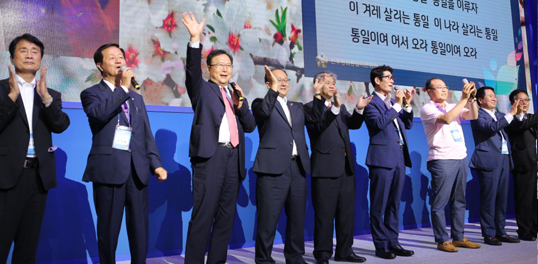
Council members singing “Our Wish” together



